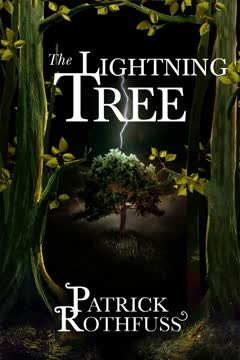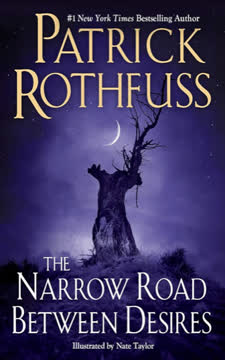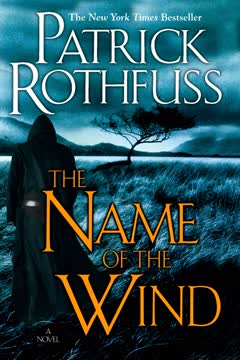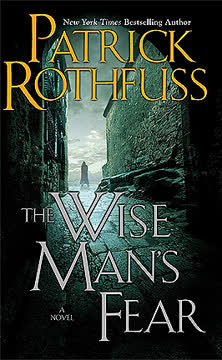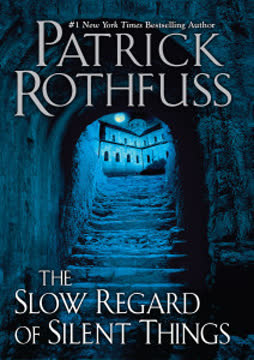Plot Summary
Bast's Secret Morning Escape
Bast, the enigmatic and mischievous apprentice at the Waystone Inn, tries to slip out unnoticed for his daily wanderings. His master, the innkeeper, calls him back, revealing a subtle but deep bond between them. Bast's wild, sly nature is immediately apparent, as is his desire for freedom and secrecy. The innkeeper's request for errands—eggs and carrots—grounds Bast in the mundane, but the mention of a boy seeking him hints at the secret life Bast leads outside the inn's walls. This opening sets the tone: Bast is a creature of both worlds, balancing the ordinary with the extraordinary, and his day will be shaped by the needs and secrets of the village's children.
The Lightning Tree's Bargains
At the ancient, scarred lightning tree, Bast becomes a figure of myth and mischief for the village children. They come to him with problems—cuts, lies, and secrets—and Bast dispenses solutions in exchange for small treasures, gossip, or favors. The tree itself, with its ritual circles and charred crown, is a symbol of both power and brokenness, a place where bargains are struck and the rules of childhood and magic intertwine. Bast's interactions are playful but edged with danger, as he navigates the children's needs and the subtle boundaries of his own nature. The tree is a hub of hidden transactions, where innocence meets cunning.
Lies, Revenge, and Sweet Buns
Bast's morning is a parade of children seeking his help: Brann, the baker's son, needs a convincing lie to avoid punishment; Kale, burning with jealousy, wants revenge on his brother. Bast's solutions are clever, sometimes cruel, always tailored to the child's desire and the currency of secrets or sweets. The exchanges are transactional but intimate, revealing Bast's understanding of human nature and the small economies of power among the young. Each bargain is a lesson in consequence, and Bast's role is both mentor and trickster, shaping the children's fates with a mix of empathy and sly manipulation.
Shepherd's Pipes and Seduction
After his dealings at the tree, Bast crafts a set of shepherd's pipes and wanders into the hills, where he finds a young woman tending sheep. His music is enchanting, and the encounter is charged with playful seduction and unspoken magic. The shepherdess, seemingly oblivious, is drawn into Bast's orbit, and their interaction is a dance of desire and innocence. Bast's otherworldly allure is on full display, blurring the line between human and fae, pleasure and danger. The episode is a reminder of Bast's dual nature: both a part of the village and forever apart from it, seeking connection through charm and mischief.
Questions of the Fae
Kostrel, a sharp-witted village boy, bargains with Bast for answers about the Fae. Their exchange is a battle of wits, with Kostrel demanding full, honest answers and Bast navigating the perilous edge of truth and secrecy. The conversation reveals the complexity of the Fae: their diversity, their powers, their relationship to the mortal world. Bast's answers are both illuminating and evasive, offering glimpses of a world beyond the village's ken. The boy's curiosity is dangerous, and Bast feels the tension between his own desires and the risks of revealing too much. The scene is a meditation on knowledge, power, and the cost of curiosity.
Glammourie and Grammarie
Bast distinguishes between glammourie—the art of seeming—and grammarie—the craft of being. Through stories and demonstrations, he shows Kostrel how the Fae shape reality, making things appear or become more than they are. The lesson is both practical and philosophical, exploring the difference between illusion and essence, and the ways magic can transform the world or merely mask it. Bast's explanations are laced with warnings, as he senses the boy's hunger for dangerous knowledge. The interplay of magic and meaning is central, and Bast's own conflicted desires—his longing for simplicity, his fear of consequence—are laid bare.
The Mayor's Daughter's Dilemma
Viette, the mayor's young daughter, comes to Bast with a kitten and a problem: her father won't let her keep it. Bast guides her through a plan of gentle manipulation—feigned illness, hidden food, strategic tears—to win her father's sympathy. The exchange is transactional, with Viette paying in secrets and promises of flowers. Bast's approach is both caring and calculating, teaching the girl the subtle arts of persuasion and the value of secrets. The scene highlights the blurred lines between magic and mundane cunning, and Bast's role as both protector and corrupter of innocence.
Rike's Desperate Request
Rike, an older, troubled boy, seeks Bast's help with a terrible problem: his abusive father. The request is fraught with pain, anger, and shame, and Bast is forced to confront the limits of his own power and the darkness at the heart of human suffering. Rike's desperation is palpable, and his willingness to pay any price underscores the gravity of his situation. Bast's response is measured, demanding a steep price and careful preparation. The encounter is a turning point, forcing Bast to reckon with the consequences of his bargains and the true cost of intervention.
Flowers, Baths, and Blue Blossoms
Bast orchestrates a magical display for Emberlee, the village's third-prettiest girl, as she bathes in a hidden pool. Transforming flowers to blue and sending them downstream, he creates an enchanting scene that culminates in a playful, sensual encounter. The episode is a celebration of beauty, desire, and the power of small magics to shape experience. Bast's actions are both self-indulgent and generous, a gift to himself and to Emberlee. The scene is suffused with longing and delight, but also with the bittersweet knowledge that such moments are fleeting and fragile.
The Still and the Book
Bast, following a tip, finds Crazy Martin's hidden still and samples its potent liquor. The discovery is both a personal pleasure and a potential boon for the inn, as Bast schemes to use the still's output to settle debts and stock the bar. The episode is tinged with risk—Martin's reputation for violence, the danger of being caught—and with Bast's characteristic blend of curiosity and cunning. The return of the precious book, Celum Tinture, is a small victory, but the day's adventures have left Bast with new debts and complications.
Carrots, Bees, and Nettie
Bast visits the Williams farm, seeking carrots for the inn. He finds Nettie, Rike's weary but resilient mother, and offers to help with chores in exchange for vegetables. Their interaction is gentle, marked by mutual respect and unspoken yearning. Bast's skill with bees and his appreciation for small sweetnesses reveal his capacity for tenderness and his longing for connection. The scene is a respite from the day's troubles, a moment of shared labor and quiet understanding. Yet, the shadow of Rike's request and the family's hardship linger in the background.
Riddles and Rainwater
Wilk and Pem, siblings, come to Bast for a riddle to stump a friend. In return, Bast enlists their help in gathering rainwater and acorns for a charm. The exchange is playful, but the tasks are imbued with magical significance. Bast's interactions with the children are a blend of mentorship and manipulation, teaching them to see the world's hidden possibilities while also using their innocence for his own ends. The scene is a microcosm of Bast's role in the village: a source of wonder, a dealer in secrets, and a subtle shaper of destinies.
The Go-Thither Charm
Bast prepares a magical charm for Rike, using a river stone, a borrowed needle, and drops of blood. The ritual is simple but charged with meaning, a blend of folk magic and personal sacrifice. Rike's insistence that the charm be for his mother, not himself, reveals his deep fear of becoming like his father and his desperate desire to protect his family. Bast's guidance is both practical and compassionate, masking the limits of his power with the comfort of ritual. The making of the charm is a moment of hope and vulnerability, a fragile bulwark against the world's cruelties.
The Price of Protection
As Rike struggles with guilt and fear, Bast reassures him, insisting that the charm's magic depends on daily expressions of love. The exchange is a lesson in the power of words and the necessity of connection. Bast's own uncertainty and frustration with human frailty are evident, as he grapples with the complexities of desire, protection, and self-worth. The scene is a meditation on the limits of magic and the deeper magic of kindness and affirmation. Rike's journey is one of pain and hope, and Bast's role is both healer and witness.
Gossip at the Waystone Inn
As evening falls, the inn becomes a hub of gossip and speculation. News of Jessom's accident, Martin's rage, and the day's small dramas ripple through the patrons. Bast listens, observes, and subtly shapes the conversation, his own actions and secrets woven into the fabric of village life. The scene is a portrait of community, with its rivalries, loyalties, and shared anxieties. The inn is both sanctuary and stage, a place where stories are told and retold, and where the consequences of the day's bargains begin to unfold.
The Fate of Jessom
The village learns that Jessom, Rike's abusive father, has been driven out—whether by accident, magic, or the workings of fate. The relief is palpable, but the cost is not forgotten. The community debates the nature of justice, the dangers of vengeance, and the boundaries of forgiveness. Bast's certainty that Jessom will not return is both a comfort and a warning, a reminder of the power and peril of intervention. The episode is a reckoning, as the village comes to terms with the darkness in its midst and the fragile peace that has been restored.
Bast's Lessons and Losses
Alone with the innkeeper, Bast recounts the day's adventures—his successes, failures, and the lessons learned. The conversation is light, but beneath it runs a current of longing and regret. Bast's role as trickster, teacher, and outsider is reaffirmed, and his relationship with the innkeeper is both affectionate and tinged with sadness. The day's bargains have brought both joy and sorrow, and Bast is left to ponder the limits of his power and the cost of his desires. The scene is a quiet coda, a moment of rest before the next day's challenges.
Nightfall: Truths and Tenderness
As night falls, Bast tends to his wounds and reflects on the tangled web of secrets, bargains, and desires that shape his life. The village sleeps, but Bast remains awake, caught between worlds—fae and mortal, child and adult, trickster and protector. The story ends with a sense of unresolved longing and the promise of new beginnings. Bast's journey is ongoing, his role ever-shifting, but the day's lessons linger: the power of kindness, the necessity of connection, and the enduring magic of hope.
Characters
Bast
Bast is a fae creature living in the guise of a human, serving as apprentice to the innkeeper. He is charming, sly, and deeply curious, straddling the line between mischief and compassion. Bast's role as the village's secret problem-solver reveals his longing for connection and meaning, even as he remains fundamentally other. His interactions with children are playful but edged with danger, and his magic is as much about understanding human nature as it is about supernatural power. Bast's internal conflict—between desire and duty, simplicity and complexity—drives the narrative, making him both a source of wonder and a figure of melancholy.
The Innkeeper (Reshi/Kvothe)
The innkeeper, known as Reshi to Bast, is a figure of quiet authority and deep sadness. Once a legendary hero, he now lives in obscurity, tending the Waystone Inn and hiding from his past. His relationship with Bast is paternal but tinged with regret, as he struggles to guide and protect his apprentice while grappling with his own failures. The innkeeper's presence grounds the story, providing a counterpoint to Bast's wildness and a reminder of the costs of heroism and loss. His tired wisdom and understated kindness are a quiet force in the village's life.
Rike
Rike is a boy on the cusp of adolescence, marked by anger, fear, and a deep sense of powerlessness. Abused by his father, he seeks Bast's help in a moment of desperation, willing to pay any price for deliverance. Rike's journey is one of pain and hope, as he confronts the darkness within his family and himself. His insistence on protecting his mother, even at his own expense, reveals a capacity for love and sacrifice that belies his rough exterior. Rike's story is a testament to the resilience of the human spirit and the complexities of growing up in a world marked by violence.
Kostrel
Kostrel is a sharp, inquisitive boy who challenges Bast with his questions about the Fae. His intelligence and curiosity set him apart from the other children, and his hunger for forbidden knowledge is both admirable and dangerous. Kostrel's interactions with Bast are a battle of wits, revealing the risks and rewards of seeking truth in a world of secrets. His cleverness is a double-edged sword, opening doors to wonder but also to peril. Kostrel embodies the restless spirit of youth, always pushing boundaries and questioning the world's hidden rules.
Viette
Viette, the mayor's youngest daughter, is a study in innocence and cunning. Her desire to keep a kitten leads her to Bast, who teaches her the subtle arts of persuasion and the value of secrets. Viette's willingness to trade confidences and favors reveals her adaptability and her growing understanding of the world's complexities. She is both a symbol of childhood's vulnerability and a budding practitioner of its small manipulations. Viette's story is a gentle exploration of the ways children learn to navigate power and desire.
Nettie
Nettie is Rike's mother, a woman worn by hardship but sustained by love for her children. Her interactions with Bast are marked by kindness, humor, and a quiet dignity. Nettie's resilience in the face of abuse and poverty is a testament to her strength, and her willingness to accept help—however small—reveals her capacity for hope. She is a stabilizing force in her family, and her presence is a reminder of the quiet heroism that sustains communities in the face of adversity.
Brann
Brann, the baker's son, is a typical village boy, quick to seek Bast's help in avoiding punishment. His willingness to trade secrets and sweets for a convincing lie reveals the small economies of childhood and the ways children navigate authority. Brann's story is a minor but telling example of the ways Bast shapes the lives of those around him, offering both protection and complicity in the small dramas of village life.
Kale
Kale is a boy consumed by jealousy and a desire for revenge against his brother. His request for Bast's help is both petty and poignant, revealing the intensity of childhood emotions and the ways they can drive action. Kale's willingness to trade valuable secrets for a scheme of revenge highlights the transactional nature of Bast's relationships with the children and the ways small grievances can loom large in a child's world.
Emberlee
Emberlee is the village's third-prettiest girl, the focus of Bast's magical seduction. Her role is largely symbolic, representing the allure of beauty and the power of desire. Emberlee's encounter with Bast is a moment of enchantment and delight, a brief escape from the ordinary. She is both a participant in and a beneficiary of Bast's magic, her presence a reminder of the pleasures and perils of longing.
Crazy Martin
Crazy Martin is a figure of fear and fascination in the village, known for his violent temper and his hidden still. His presence looms over the story, a reminder of the dangers that lurk at the edges of community life. Martin's still is both a source of pleasure and a potential flashpoint for conflict, and his unpredictable nature adds an element of risk to Bast's adventures. Martin embodies the wildness and unpredictability that Bast both craves and fears.
Plot Devices
The Lightning Tree as Liminal Space
The lightning tree serves as the story's central symbol and setting, a place where the boundaries between worlds—childhood and adulthood, human and fae, mundane and magical—are blurred. It is a site of ritual, negotiation, and transformation, where Bast dispenses wisdom, magic, and mischief in exchange for secrets and favors. The tree's scarred, broken form mirrors the brokenness and resilience of the characters who gather there. As a plot device, the tree anchors the narrative, providing a space for encounters that shape the village's hidden life.
Transactional Magic and the Economy of Secrets
The story is structured around a series of bargains—lies for sweets, revenge for secrets, protection for sacrifice. Bast's magic is transactional, rooted in the exchange of favors, confidences, and small treasures. This economy of secrets reflects the social dynamics of the village and the ways power is negotiated and maintained. The transactional nature of magic also serves as a commentary on the costs and consequences of intervention, highlighting the limits of power and the necessity of reciprocity.
Foreshadowing and Narrative Circles
The narrative is rich with foreshadowing—hints of danger, glimpses of the fae world, warnings about the limits of magic. The story's structure is circular, with events and motifs recurring in new forms: the rituals at the tree, the bargains with children, the cycles of desire and regret. These narrative circles reinforce the themes of repetition and transformation, and the ways the past shapes the present. The use of ritual and repetition also underscores the story's exploration of tradition, memory, and the search for meaning.
Blurring of Magic and Mundane
The story blurs the boundaries between the magical and the mundane, showing how small acts of cunning, kindness, and ritual can have transformative effects. Bast's magic is often indistinguishable from cleverness or empathy, and the line between supernatural power and human ingenuity is deliberately ambiguous. This blurring serves to highlight the wonder and danger inherent in everyday life, and the ways magic can be found—or made—in the ordinary.
Analysis
"The Lightning Tree" is a deceptively simple tale that weaves together the everyday and the extraordinary, using the figure of Bast as both trickster and teacher. Through a series of bargains and encounters, the story explores the complexities of power—who has it, how it is used, and what it costs. Bast's magic is rooted in understanding and manipulating desire, but his interventions are never without consequence. The narrative is a meditation on the limits of agency, the necessity of connection, and the enduring wounds of trauma. The children's problems, from petty lies to desperate pleas for protection, mirror the larger struggles of the adult world, and Bast's role as intermediary is both a blessing and a burden. The story's structure—episodic, circular, and richly symbolic—invites readers to reflect on the ways we seek meaning, safety, and love in a world marked by uncertainty and loss. Ultimately, "The Lightning Tree" is a story about the power of small magics—kindness, courage, and the willingness to bear witness—to shape lives and heal wounds, even as it acknowledges the fragility and impermanence of such gifts.
Last updated:
Review Summary
The Lightning Tree receives mostly positive reviews, praised for its engaging writing and deeper exploration of Bast's character. Readers enjoy the whimsical tone and clever plot connections. However, some criticize Rothfuss's portrayal of female characters and Bast's occasionally questionable behavior. The novella provides insight into Bast's daily life in Newarre, showcasing his interactions with villagers and his fae nature. While not essential to the main series, fans appreciate the additional worldbuilding and character development.
The Kingkiller Chronicle Series
Download PDF
Download EPUB
.epub digital book format is ideal for reading ebooks on phones, tablets, and e-readers.
